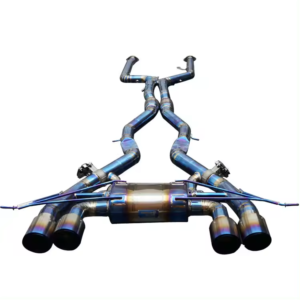Your vehicle’s exhaust system plays a crucial role in ensuring that your engine runs efficiently and that harmful gases are properly filtered and expelled. Over time, however, the exhaust system can wear out due to age, driving conditions, and exposure to the elements. Knowing when it’s time to replace your exhaust system can help you avoid costly repairs, improve vehicle performance, and maintain a cleaner environment. In this article, we’ll explore the signs that indicate it’s time for an exhaust system replacement.
1. Loud or Unusual Noises
One of the most noticeable signs that your exhaust system needs attention is a loud or unusual noise. The exhaust system is designed to minimize noise from the engine, and if you start hearing rumbling, hissing, or even a loud roar, it’s time to investigate further.
- Excessive Noise: A loud or throaty noise often suggests a problem with the muffler or catalytic converter. Mufflers are designed to reduce the sound of exhaust gases, so if your muffler is damaged, your vehicle may become significantly louder.
- Hissing Noise: A hissing sound, particularly when the engine is running, could be a sign of a leak in the exhaust system, often near the exhaust manifold or a connection point.
- Rumbling or Roaring Noise: If you notice a low rumble or roar, it could indicate a hole or crack in the exhaust pipe, allowing exhaust gases to escape. This not only increases the noise but also diminishes engine performance.
If any of these noises seem louder than usual or appear suddenly, it’s a clear sign that your exhaust system needs an inspection and potentially a replacement.
2. Reduced Fuel Efficiency
A well-functioning exhaust system helps the engine to burn fuel efficiently. When components like the catalytic converter or muffler become clogged or damaged, they can restrict the flow of exhaust gases and affect the engine’s ability to expel them efficiently. This can lead to reduced fuel efficiency.
If you notice that you’re filling up more frequently or that your car seems to be consuming more fuel than usual, the exhaust system could be the culprit. In particular, a failing catalytic converter can cause the engine to work harder, using more fuel in the process. Replacing the faulty exhaust system components will restore optimal fuel efficiency and help save you money on gas.
3. Decreased Engine Performance
A faulty exhaust system doesn’t just affect fuel efficiency—it can also reduce the overall performance of your engine. When exhaust gases aren’t flowing freely, it can cause backpressure, forcing the engine to work harder than it should. This may result in reduced acceleration, sluggish performance, and difficulty maintaining speed.
One common issue is a clogged catalytic converter. When this component becomes clogged, it prevents exhaust gases from flowing through the system properly, causing the engine to strain. This leads to poor acceleration, difficulty climbing hills, and an overall decrease in engine power. If you notice any of these symptoms, it’s worth having your exhaust system checked for potential blockages or damage.
4. Visible Damage or Corrosion
Rust and corrosion are natural enemies of the exhaust system, especially in areas where winter conditions involve exposure to salt and moisture. Over time, the metal components of the exhaust system—particularly the pipes, muffler, and catalytic converter—can begin to deteriorate.
- Visible Rust: If you notice rust or flaking on any part of the exhaust system, it’s an indication that the metal is weakening and could soon fail. Rust can eventually cause holes or cracks, leading to leaks and decreased performance.
- Holes or Cracks: If you spot any visible holes or cracks in the exhaust pipes or muffler, it’s a strong indication that the exhaust system is compromised. These cracks allow harmful gases like carbon monoxide to escape and enter the vehicle cabin, posing a health risk. This is especially dangerous if you drive with the windows closed or have a sealed cabin.
If you see any visible damage on the exhaust system, it’s critical to replace it as soon as possible to avoid further complications.
5. Strange Smells
Your exhaust system is designed to direct harmful gases like carbon monoxide, nitrogen oxides, and hydrocarbons away from the vehicle and into the atmosphere. If there is a problem with the exhaust system, dangerous gases may be leaking into the cabin of the car, posing serious health risks.
- Fuel Smell: If you smell a strong odor of fuel inside or around your vehicle, this could indicate a leak in the exhaust system, often near the fuel injector or the catalytic converter. This is not only unpleasant but dangerous.
- Rotten Egg Smell: A rotten egg smell (often associated with sulfur) can indicate a problem with the catalytic converter. When this component is failing, it can no longer properly convert harmful gases, leading to this pungent smell.
If you detect any strange or unusual odors, it’s important to have your exhaust system checked and replaced if necessary.
6. Check Engine Light or Emissions Warning Light
A malfunctioning exhaust system can trigger your car’s check engine light or the emissions warning light on the dashboard. The exhaust system plays a key role in controlling emissions, and if there’s an issue—such as a clogged catalytic converter, oxygen sensor failure, or exhaust leak—the engine control unit (ECU) will typically trigger a warning light.
If the check engine or emissions warning light comes on and you suspect that the exhaust system might be the problem, it’s important to get your vehicle diagnosed by a mechanic. They will often use diagnostic tools to identify the specific problem within the exhaust system and determine whether replacement parts are necessary.
7. Vibrations or Shaking
If your vehicle begins to shake or vibrate more than usual when driving, especially when accelerating, it could be a sign of a problem with the exhaust system. This is often caused by a loose or damaged exhaust part, such as a muffler or exhaust pipe.
Excessive vibrations can also indicate that there is a problem with the exhaust system hangers or brackets, which are responsible for securing the system to the vehicle. If the exhaust system is loose or misaligned, it can lead to rattling or vibrating while driving.
8. Foul Exhaust Fumes Inside the Cabin
If you begin to notice exhaust fumes inside your vehicle, this is a serious safety concern. A properly functioning exhaust system should direct all exhaust gases outside the vehicle. If there’s a leak in the exhaust pipe, muffler, or manifold, these dangerous gases can enter the cabin. This poses an immediate risk of carbon monoxide poisoning.
If you’re experiencing a noticeable presence of exhaust fumes inside the vehicle, pull over safely and stop driving. This is a clear indication that your exhaust system is severely damaged and should be replaced as soon as possible.
9. Failed Emissions Test
In many states and countries, vehicles are required to pass an emissions test to ensure that they meet environmental standards. A malfunctioning exhaust system—particularly a clogged or damaged catalytic converter—can cause your vehicle to fail the test. The exhaust system plays a critical role in reducing emissions, and if it’s not functioning correctly, your vehicle may not pass the inspection.
If your vehicle fails an emissions test, it’s worth inspecting the exhaust system as a potential cause. Replacing faulty parts of the exhaust system may allow you to pass the test and comply with local regulations.
Conclusion
The exhaust system is an integral part of your vehicle’s performance, safety, and environmental impact. Over time, components like the muffler, catalytic converter, and exhaust pipes can wear out or become damaged, leading to decreased performance, louder noises, and even health risks. Recognizing the signs that it’s time to replace your exhaust system can help you avoid serious issues and ensure that your vehicle runs smoothly and safely.
If you notice any of the signs mentioned above, such as loud noises, poor fuel efficiency, decreased performance, visible damage, strange smells, or warning lights, it’s important to have your exhaust system inspected by a professional. Timely replacement of a failing exhaust system will not only restore your vehicle’s performance but also help protect the environment and ensure your safety on the road.

 VORTEX Porsche GT3 RS Racing Edition Exhaust System (2020+)
VORTEX Porsche GT3 RS Racing Edition Exhaust System (2020+)
 VORTEX Mclaren 650S / MP4-12C (2014-2016) Exhaust System
VORTEX Mclaren 650S / MP4-12C (2014-2016) Exhaust System
 VORTEX BMW F87 M2 Competition Valved Sport Exhaust System
VORTEX BMW F87 M2 Competition Valved Sport Exhaust System
 VORTEX BMW M240i G42 Valved Sport Exhaust system
VORTEX BMW M240i G42 Valved Sport Exhaust system
 VORTEX BMW G80 G82 G83 M3 / M4 2020 – 2023 Valved Exhaust System
VORTEX BMW G80 G82 G83 M3 / M4 2020 – 2023 Valved Exhaust System









